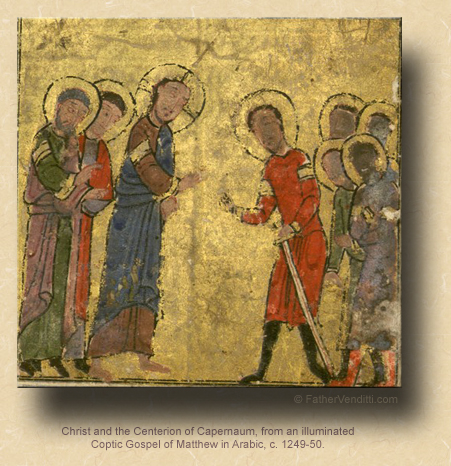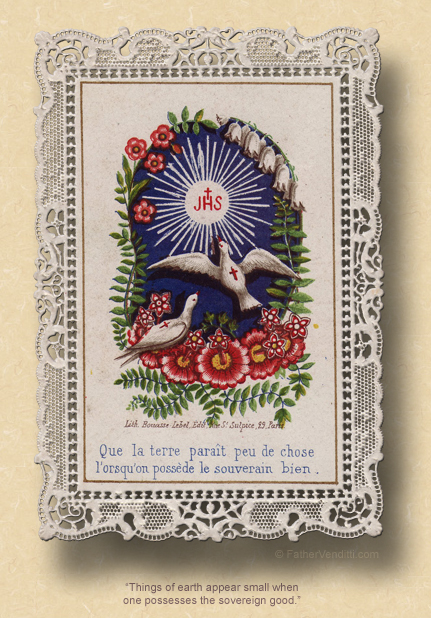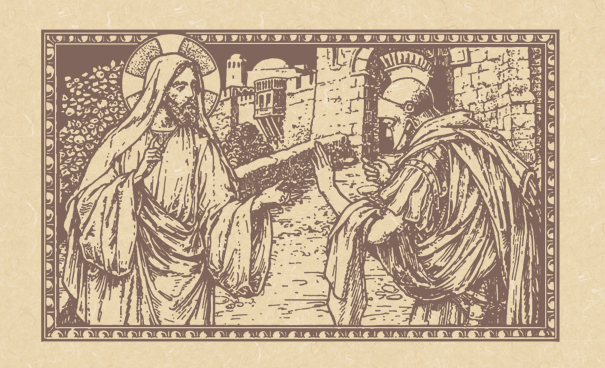Never Ask Our Lord a Question Unless You're Willing to Accept His Answer.
The Twenty-First Sunday of Ordinary Time.
Lessons from the tertiary dominica, according to the ordinary form of the Roman Rite:
• Isaiah 66: 18-21.
• Psalm 117: 1-2.
• Hebrews 12: 5-7, 11-13.
• Luke 13: 22-30.
The Eleventh Sunday after Pentecost.
Lessons from the dominica, according to the extraordinary form of the Roman Rite:
• I Corinthians 15: 1-10.
• Psalm 27: 7.
• Mark 7: 31-37.
FatherVenditti.com
|
 5:41 AM 8/25/2019 — It’s no secret that the Gospels cannot be relied upon to present an accurate chronology of our Lord’s life on earth. While Matthew, Mark and Luke describe the three years of our Lord’s public life, John presents the events of his Gospel as occurring in a single year because he knew his Gospel would be more useful to the Church’s liturgical calendar which, by the time he wrote, already existed. The four Evangelists, writing to different audiences, choose what events to record and how to order them, sometimes compressing events for effect, or omitting them altogether, or even repeating them. 5:41 AM 8/25/2019 — It’s no secret that the Gospels cannot be relied upon to present an accurate chronology of our Lord’s life on earth. While Matthew, Mark and Luke describe the three years of our Lord’s public life, John presents the events of his Gospel as occurring in a single year because he knew his Gospel would be more useful to the Church’s liturgical calendar which, by the time he wrote, already existed. The four Evangelists, writing to different audiences, choose what events to record and how to order them, sometimes compressing events for effect, or omitting them altogether, or even repeating them.
And you could find no more striking example of this than in the last couple of verses of today’s Gospel lesson: “And people will come from the east and the west and from the north and the south and will recline at table in the kingdom of God. For behold, some are last who will be first, and some are first who will be last” (Luke 13: 29-30 NABRE); two verses that occur four times in the Gospels, twice in Matthew and twice in Luke, not to be found at all in Mark or John. The first two times they occur, in both Matthew and Luke, they are spoken by our Lord in the context of His meeting with a centurion in Capernaum whose slave is at the point of death. John tells this story as well, but for some reason changes the centurion’s slave into the centurion’s son, for what reason we have no way of knowing; but, his account of it is extremely brief, and doesn’t include the two verses in question.
So, we’ve looked at these verses before. Our Lord spoke them as a follow-up lesson to the shocking statement He made to his disciples regarding the centurion: “…not even in Israel have I found such faith!” (Matt. 5: 10 NABRE), words that must have stunned His disciples. Our Lord, after all was a Jew, and all His followers were Jews, and those that believed in Him surely believed Him to be the Messiah promised by the prophets, who were also Jews. Rome, remember, was the enemy; and this Roman, a worshiper of false gods and idols, an officer in the Roman Legion occupying Jerusalem, had more faith in our Lord than all of them combined, or so our Lord says. How is that possible?
Well, it’s possible because faith is a gift. God can give it to whomever He chooses. To be sure, it was the leaders of our Lord’s own religion who delivered Him over to death, not the Romans; Pilate, remember, wanted to let Him go, and acquiesced only because he feared a riot instigated by the Synagogue leaders. And just to make sure that the lesson is not lost on His disciples, our Lord says it very bluntly: “…many will come from east and west and sit at table with Abraham, Isaac and Jacob in the kingdom of heaven” (Matt. 8: 11 NABRE). His point, on that occasion, is that there is no geographical boundary to salvation.  The centurion, after all, wasn’t a Jew or a Christian. He was just a man with a problem, and he took that problem to our Lord with faith and humility. He wore the uniform of Rome, and probably sacrificed to the Roman Gods; but, it was in a moment of crisis—the pending death of someone close to him—that the truth of his character became apparent. The centurion, after all, wasn’t a Jew or a Christian. He was just a man with a problem, and he took that problem to our Lord with faith and humility. He wore the uniform of Rome, and probably sacrificed to the Roman Gods; but, it was in a moment of crisis—the pending death of someone close to him—that the truth of his character became apparent.
Matthew and Luke probably repeated those verses here, in Matthew chapter seven and Luke chapter thirteen, because they add extra clarity to the similar point our Lord is making here. He’s on a preaching tour, as the passage of today’s lesson tells us from the outset: “He went on his way through towns and villages, teaching, and journeying toward Jerusalem” (Luke 13: 22 Knox). Neither of the Evangelists tells us what he was teaching about as He went along, but we can actually play Sherlock Holmes and deduce backwards because of the question that’s asked Him, which Luke records for us: “And some one said to him, ‘Lord, will those who are saved be few?’ And he said to them, ‘Strive to enter by the narrow door; for many, I tell you, will seek to enter and will not be able’” (vs. 23-24 NABRE).
So, let’s put on our deer-stalkers and reason backwards from the question. Why would someone ask Him, “Lord, will those who are saved be few?” Obviously, because our Lord must have been painting a very draconian picture of what one would have to do to be saved. We can recall examples of this from things our Lord said on other occasions, some of which formed the Gospel lessons for daily Mass very recently: “If your right eye causes you to sin, pluck it out and throw it away; it is better that you lose one of your members than that your whole body be thrown into hell” (Matt. 5: 29 NABRE); “Again I tell you, it is easier for a camel to go through the eye of a needle than for a rich man to enter the kingdom of God” (Matt. 19: 24 NABRE); “I tell you, in that night there will be two men in one bed; one will be taken and the other left. There will be two women grinding together; one will be taken and the other left” (Luke 17: 34-35 NABRE).  And there’s certainly no reason to suppose that our Lord’s preaching would change substantially over the course of time; the things He preached that are recorded for us can’t be all that different from the things He said which remain hidden. Assuming that what He was saying during this journey to Jerusalem is essentially the same message He’s been giving all along, then the reason for the question posed to Him is pretty obvious: with all the severe things our Lord has been saying about how harshly we will all be judged when the time comes, it causes even us to ask the same question: “Lord, will those who are saved be few?” And there’s certainly no reason to suppose that our Lord’s preaching would change substantially over the course of time; the things He preached that are recorded for us can’t be all that different from the things He said which remain hidden. Assuming that what He was saying during this journey to Jerusalem is essentially the same message He’s been giving all along, then the reason for the question posed to Him is pretty obvious: with all the severe things our Lord has been saying about how harshly we will all be judged when the time comes, it causes even us to ask the same question: “Lord, will those who are saved be few?”
What I find most interesting about this whole episode is the way the question is worded. I won’t bother you with the Greek,* but the person who asks it—not named by either Evangelist—words the question in a very detached way, almost as if he’s totally unconcerned about the answer, as if it were all just an academic exercise for him. I’m not a psychologist, but I would tend to guess that his manner of putting the question is really nothing more than a defense mechanism, an attempt to isolate himself from the consequences of the answer. Put yourself in his shoes: if we were asking this question of our Lord, we might say, “Lord, will those who are saved be few?” but what would really be on our minds is, “Lord, am I going to be saved?” He’s asking the question because some of the things he’s heard our Lord saying have struck him to the heart: either consciously or unconsciously, he’s applied them to his own life, and must now face the awful possibility that he may not be going to heaven when he dies. But, like most of us, I suppose, he doesn’t want to face that possibility; he asks his question because the matter is obviously of deep concern and importance, but the possibility of an unfavorable answer is a prospect too terrible to face, so he changes the nature of the question: instead of asking, “Lord, will I be saved?” he asks instead, “Lord, will those who are saved be few?” as if he’s not even involved.
We all play this moral game to an extent, but there are some people who do so to an extreme degree. Many years ago, when I was serving as a hospital chaplain, I encountered a woman who was in complete denial that she had breast cancer. She had refused all treatment and, by the time I met her, the cancer was so advanced that the cancerous tumor in her breast had grown so large that it broke through the skin and was protruding out of the bottom of her breast; and even then, she could not bring herself to admit that she was sick. Now, there’s no such thing as a person who is one hundred percent psychologically healthy—we all have our deficiencies and quirks—but most of us, I hope, are not so defective that we lapse into a denial of reality so extreme that it kills us.
 But being in denial over a physical illness is a lot harder than being in denial over the spiritual illness of sin. The sickness of sin doesn’t generate physical aches and pains difficult to ignore without some sort of psychosis; to be aware of our sins we have to have some appreciation for the Truth of the Faith. We have to become practiced at examining our consciences, and we have to do it without rationalizing, so that we can confess our sins cleanly and completely. For some people, that’s not easy, because it requires a spirit of humility. What’s most important of all, I suppose, is that we must convince ourselves of the necessity of being freed from our sins as a condition for entering the kingdom of heaven. If we can’t convince ourselves of that, then we’ve already lost the battle. But being in denial over a physical illness is a lot harder than being in denial over the spiritual illness of sin. The sickness of sin doesn’t generate physical aches and pains difficult to ignore without some sort of psychosis; to be aware of our sins we have to have some appreciation for the Truth of the Faith. We have to become practiced at examining our consciences, and we have to do it without rationalizing, so that we can confess our sins cleanly and completely. For some people, that’s not easy, because it requires a spirit of humility. What’s most important of all, I suppose, is that we must convince ourselves of the necessity of being freed from our sins as a condition for entering the kingdom of heaven. If we can’t convince ourselves of that, then we’ve already lost the battle.
“Lord, will those who are saved be few?” You’ll notice that our Blessed Lord answers the question, and the translation given in the Roman Missal may the best: “Strive to enter through the narrow gate, for many, I tell you, will attempt to enter, but will not be strong enough” (Luke 13: 24 RM3). The strength He’s referring to is the strength to empty ourselves, to own up to our sins, to cast off our pride and stop rationalizing our behavior. Humility is a most maligned virtue; it’s misinterpreted as weakness and passivity. In reality, humility requires all the strength we can muster, so much so that we can get that kind of strength only through Grace, primarily the Grace that’s offered to us in the Sacrament of Confession and in the Blessed Eucharist. And that Grace is offered to us by our Lord for the asking. All we have to do is ask.

* …κύριε, εἰ ὀλίγοι οἱ σῳζόμενοι[?]….
|

